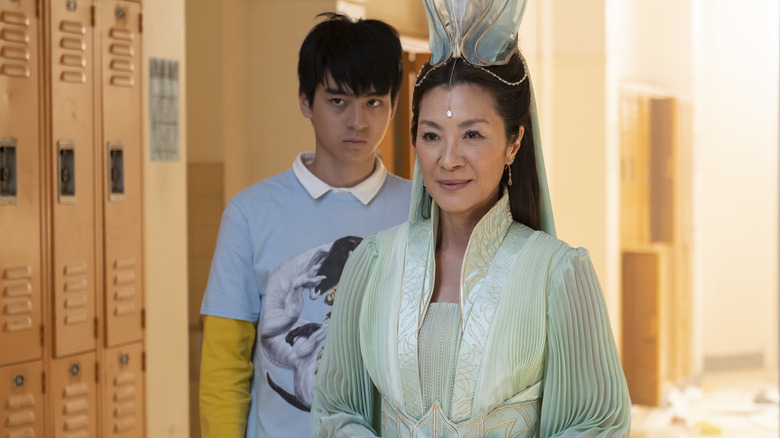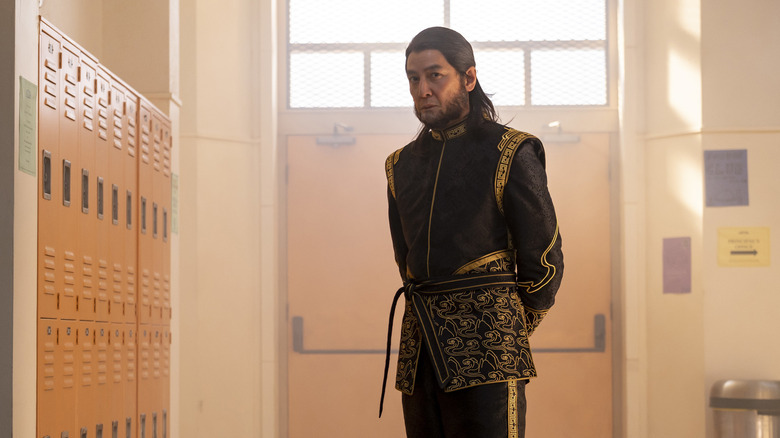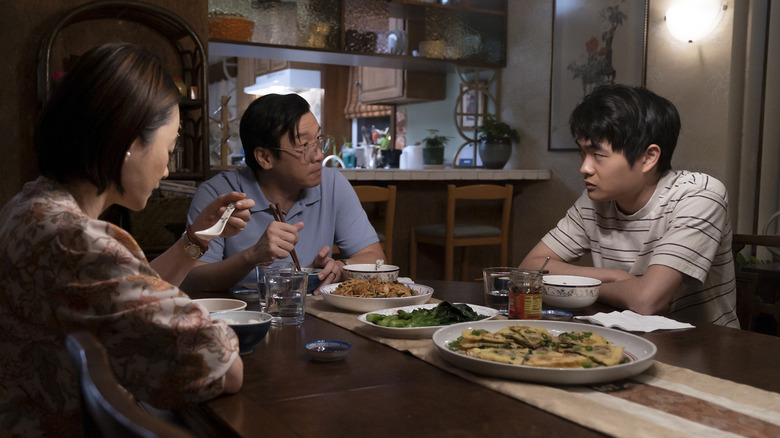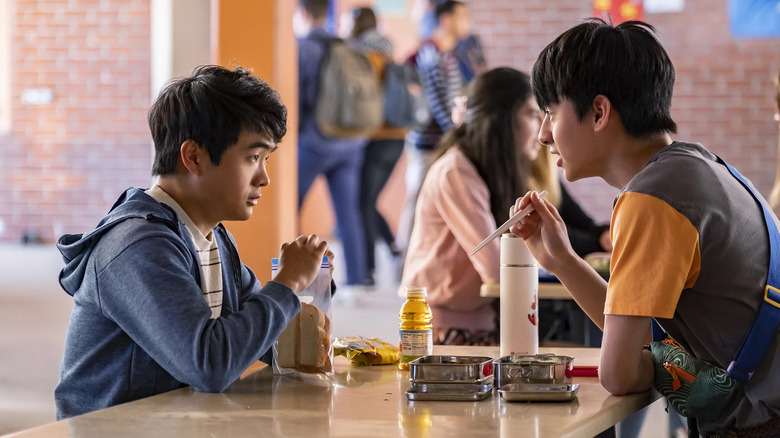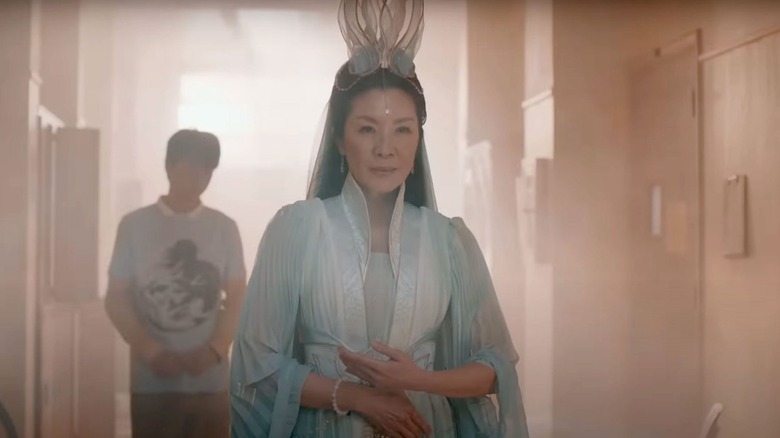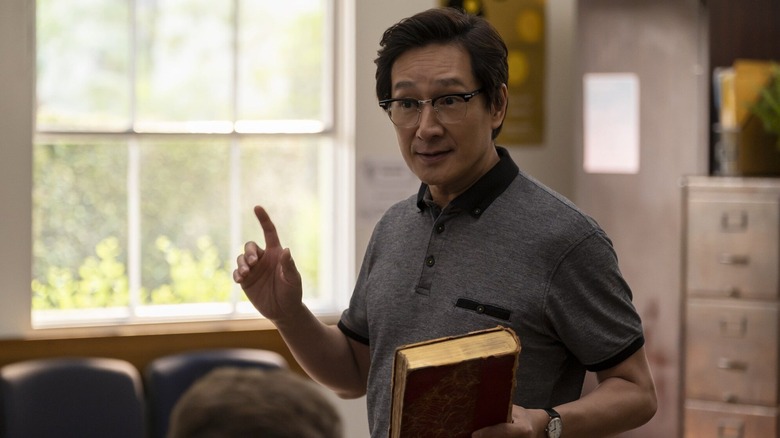American Born Chinese Showrunner On Casting Ke Huy Quan, Michelle Yeoh, And More [Exclusive Interview]
There are a few fringe benefits of a streaming show having its big premiere at SXSW. First and foremost, if your pilot is good, you can generate some good buzz with that receptive audience, which is valuable from a promotion point of view. But when you think about the filmmaker's viewpoint, this could be the only time they get to watch their story with an audience.
In the age of streaming, so much content is meticulously crafted, with just as much care put into the storytelling as any big tentpole movie, but the creators don't get to have that audience experience.
In the case of "American Born Chinese," most of the cast and crew got that rare chance to see how their audience-pleasing first two episodes played for a crowd at the historic Paramount Theater in downtown Austin. /Film's Rafael Motamayor was in attendance and had a lot of nice things to say about these first two episodes.
I was lucky enough to sit down with Kelvin Yu, the series creator, just before his big premiere where we talked a bit about watching the culmination of their hard work with a crowd, why the time is right for audiences to embrace a show starring mostly Asian and Asian American actors, and the serendipity of sharing the bulk of his cast with the now-dominant Oscar-winning movie "Everything Everywhere All At Once."
Note: This interview has been lightly edited for clarity and brevity.
'How do you take a book like that and do it justice?'
You must be really excited to watch "American Born Chinese" on the big screen with a rowdy crowd.
Yeah. It's a big deal.
Not a lot of Disney+ programs get to have that full-on audience experience.
Yeah. There's nothing like that audience experience. We've had the chance to show clips, and there's moments that get reactions, but until you really see it with a full audience, you don't know how it plays. I mean, I have faith and I'm excited, but I'm really thrilled and so anxious to see how people — and also to see what surprises me, where people are reacting, et cetera.
I'm a writer on "Bob's Burgers," as well. Until Covid came along, we did weekly table reads. And I don't think there was any part of the process that was more important than those table reads. You were encouraged to invite friends, family, because you just didn't know. You didn't know. You'd write the best joke of your life and it would die a sad death on the day. Then Jon Benjamin would say, "Oh, my God!" and it would be the biggest laugh of the week. And you're like, "That's ... 'Oh, my God!' is the biggest laugh of the week? We worked on this script for months." So it really does come down to that in the room, visceral reaction.
Can you talk a little bit about your origin story with "American Born Chinese"? Do you go back to the comic, or is this something that you discovered later and then decided it would make a good series?
Like a lot of people in my community, but also just at large in America, I had read the graphic novel. I don't think I read it when I first came out in '06, but probably shortly thereafter — maybe '07, '08. It's an important work. It's one of the only, especially at that time, pieces of literature that speaks directly to the experience of being Asian and American, because there's a lot of Asian content. There's obviously a lot of American mainstream content, but this was specifically about my experience.
So, for that reason, it was meaningful. I think just as importantly, it's really accessible. I don't know if you've ever looked at it, but it's fun to read. You can read it multiple times, because you're always finding new things. And the structure of it is constantly changing, so you're in a new world every few pages. It just did the trick.
Then, meanwhile, I am an actor as well, and I was working in TV and film. I started writing for "Bob's Burgers" in 2010, so I'm also cutting my teeth as a writer. Then it all comes to a point of intersection in 2018, when Melvin Mar, the producer of "Fresh Off the Boat," approaches me about adapting it. It's one of those things where it's a slam dunk. Of course you want to do it, but it's also a challenge, because the question is, "How do you take a book like that and do it justice? And also bring a really interesting and novel structure to serialized television?" It's not a perfect fit. So, there was work to do.
'So many planets are lining up for people to enjoy this show'
It seems like now we're perfectly primed for this series. I read a quote from [graphic novel creator] Gene Luen Yang who said that the second generation immigrant experience is actually comparable to the Western superhero story. He was saying, "There's like double lives. You're speaking one language at home and you speak another language in public."
That's right.
"Shang-Chi" made a ton of money. "Everything Everywhere All At Once" is cleaning up at the box office and won every award. "Crazy Rich Asians" was huge. It just finally feels like we're at a point where a story like this doesn't have to be an ask. You know what I mean?
That's well put. Yeah, I agree with all of that. And that's fascinating that Gene said that. I think that's the draw of superheroes. Right? Everybody feels a little like they're an alien and their parents are hiding a spaceship underneath the barn. You know what I mean? Or maybe they magically have the ability to climb buildings like Spider-Man and just never tried it. It's all analogies and metaphors for growth and human experience and responsibility. I think that definitely applies to the experience of being Chinese American or Taiwanese American. Like you said, you speak different languages. You might have a different name at home than you do to your friends at school. There's a Clark Kent-Superman thing right there.
So the fractured identity, I think, is such a fertile ground and so important. It can either be your downfall or your superpower. Then on another level, in a totally different way, we have this mythos. And Disney's been a huge cultural conveyor of these things, from Grimm's Brothers fairy tales to Nordic gods, to superheroes now, and Darth Vader. Right? They aggregate iconic storytelling characters. And there's a huge catalog of Asian and Chinese storytelling literary characters, like Sun Wukong the Monkey King, Niu Mowang the Bull Demon, Guanyin the Goddess of Compassion. They just haven't been tapped into yet.
Hopefully, we can be the trailblazer in terms of opening a new audience to these new characters that are just as dynamic, just as interesting, that can be remixed and remixed and remixed, the same way we do it with Cinderella and Thor and Aladdin.
I'm old enough to remember the debate around subtitles in the '90s when we'd be getting a ton of Asian cinema over here, like Jackie Chan films and...
And John Woo.
Right. Back then, it was a big step to get the average audience to see something with subtitles, but I don't think that's as big of a hurdle today. And based on what I've seen of the show, "American Born Chinese" isn't just targeting Asian Americans, but is a show for everybody.
We talked about that a lot. We have an entire episode — not entirely, but we have an episode that's strongly Mandarin later in the season, and that was a conversation early on. But, at the same time we're having this conversation, the number one show in the world is "Squid Game." So everybody's going, "I don't think there's a problem here."
If anything, young people are mavens for that type of culture. They're going out to find K-Pop, or going out to find reggaeton or something from another culture that they can bring into their world. We want to embrace that. We want to see it not as an obstacle, not as a liability, but as, like I said, a superpower. So you're right. So many planets are lining up for people to enjoy this show. Not to mention, Sunday night was pretty big for some of our friends [at the Academy Awards].
'I did something good in a past life to land Ben Wang'
What's funny is now it's commonplace for people to turn on subtitles even for English language shows and movies.
I'm guilty of that. Yeah, absolutely.
The way people watch movies and TV shows is radically different. You just need to make them feel invested in the story and characters. Everything else doesn't matter anymore.
There's this moment with "The Fabelmans" where I think I also was looking at this and thinking, "How can we return to that purity of storytelling?" and that, I dare say, earnestness. And I mean that not pejoratively. When you look at early Spielberg and Amblin Spielberg, he was taking a young person's experience and he was taking it really seriously. He was shooting a nine-year-old Henry Thomas, but putting John Williams over it. So that's what we strive to do on "American Born Chinese" as well, is take Jin Wang's experience and take it very, very seriously, because we care. That's also where the show wants to live.
That's a great transition to my next question, actually. You have an amazing cast of recognizable faces, but when you're casting the lead, if Jin doesn't work, the whole thing crumbles, right?
I know. I was terrified.
And on top of that, Jin is a high schooler, so you not only had to find a good actor that fit the part, you had to find a good young actor that would fit the part.
I did something good in a past life to land Ben Wang. Somebody said he's like a Chinese Michael J. Fox. He's an unlikely leading man who you want to follow, you care about. And he somehow finds a way to stumble and fumble his way through a whole [series]. In a lovable way. Because not everybody can make that watchable, like stuttering and hesitating. Ben has that gift.
'You just couldn't think of anybody better to play Guanyin'
Y'all cast some great, recognizable faces for the supporting roles, including a ton of folks who the world fell in love with in "Everything Everywhere All At Once" like Stephanie Hsu, James Hong, Ke Huy Quan, and Michelle Yeoh. It wasn't a phenomenon yet...
We hadn't seen it. Nobody had seen it yet.
So now you look like geniuses, right?
It looks like we pivoted off of that movie, but really they were all cast before ... well, Michelle's Michelle, but a lot of it comes down to just who's good. And the same reason they got that movie is the same reason we wanted them — not just because they're famous or because they win awards, but because they're very good. Stephanie Hsu is a ... and now the world knows. But she is a very uncommon talent. She can do almost anything.
Ke was a known name, but an unknown quantity in terms of what he could bring as an actor, so we actually read him and boy, oh boy. I mean, I definitely saw what other people, clearly the Daniels, saw, which is like, "Oh, he's got it. He's still got it." He's almost like a magical creature. When he lights up and that voice comes out of him and his eyes smile, he can make a whole city light up. There's just something so joyful and so moving about his emotional engine inside.
And then Guanyin, the character, is almost like casting the Queen of England, or the Great Gatsby. You need somebody who has such a presence that you can't just cast a great actor. So Michelle Yeoh is ... I mean, you just couldn't think of anybody better to play Guanyin. In the pilot, and I think in the trailer, you see her float down. When we've gotten to show that in front of audiences, there's an audible gasp, because it's pretty much a goddess has just entered the room. And a lot of that is credited to Destin Cretton, our director, who's able to grease the wheels.
'I am so grateful he went on that journey with us'
Ke Huy Quan's had such a great comeback story. "Temple of Doom” is probably my favorite Indiana Jones movie.
Really?
I've always loved "Temple of Doom." I've been banging the drum on that forever. And I think a lot of it was because I related to Short Round as a kid. I wanted to be on adventures with Indiana Jones.
Sure. It's pretty cool.
You've talked a little bit about what Michelle brings to the role, but can you talk about what Ke brings to his role?
Yeah. Ke stayed in film. He was working in film finance as an executive for Wong Kar-wai for many years. So, he's still in the world. He clearly wanted to be adjacent, still loves the industry. But, yeah, there was a dearth of opportunities for him. And then it wasn't until things opened up ... I think he said he saw "Crazy Rich Asians" in the theaters and that itch came back. "Maybe. Maybe I can come back." And he did, and I'm glad he did.
He also brings, like Michelle, almost like a meta relationship between the audience. So when you see him, not that Short Round or Data were minstrel-esque or that type of offensive characters, because they really weren't, but there is a relationship to an older part of your brain. The character of Freddy Wong that he plays is supposed to be a '90s sitcom character, so it has that kind of meta relationship. And he was nervous. Credit to him, he should have been nervous, because if we didn't do it perfectly, it could have been really, really dangerous to try to touch that.
We basically had him on set intentionally playing a stereotype. So, if you can imagine, that felt dicey at times. Sometimes he got laughs, including from myself. We were like, "Are we supposed to be laughing at this right now?" And it was all in service of a bigger point. I think we're here now, and I think it's all on screen.
But I am so grateful he went on that journey with us. And then I'm grateful that everything happened the way it happened for him these last 12 months. You could not have written it better to get those two actors and to have this moment. And then Stephanie came on in one of our episodes to play a great character that I won't spoil.
"American Born Chinese" debuts on Disney+ on May 24, 2023.
